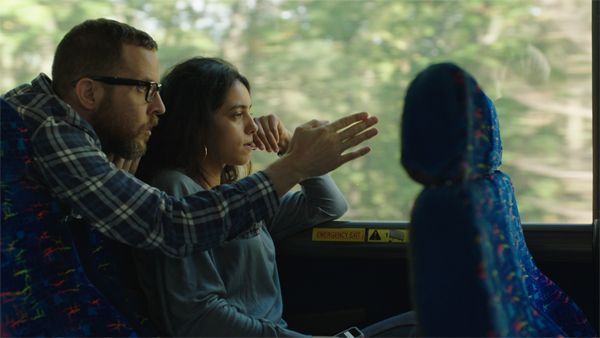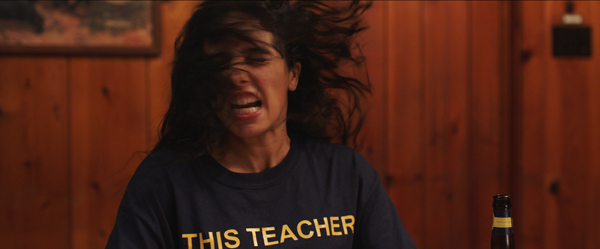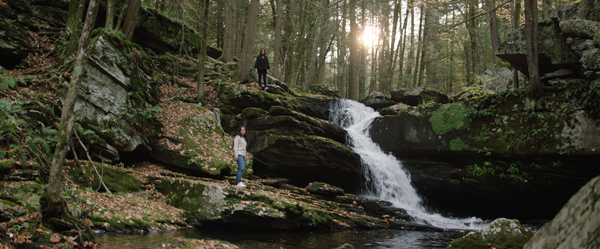IONCINEMA.com’s IONCINEPHILE of the Month feature focuses on an emerging creator from the world of cinema. This month, we are extremely honored to feature American indie helmer Mark Jackson – a filmmaker who got his start with Slamdance winner/Locarno preemed Without (2011) for which he would win the Someone to Watch Award at the Indie Spirits. He then followed that up with his sophomore Sundance selected Catherine Keener starring War Story (2014). To be released this Tuesday, June 9th by Breaking Glass Pictures, This Teacher sees the filmmaker reteam with French actress Hafsia Herzi. As part of our profile we asked the filmmaker to identify their top ten films all time – so make sure to visit that list. You can access the film: here.
Mark Jackson

Eric Lavallée: In your Filmmaker Magazine 25 New Faces profile you mentioned how you might not have had a large diet of movie watching in your youth, but when you did access cinema, was there a staple movie rental place, or early movie theater experience/memory that you recall?
Mark Jackson: A child of the 80’s, I would sneak over to the horror section in my neighborhood video store and drink in all those VHS boxes with absolute terror. So many screaming/melting faces. Something about the not-quite-realness of practical effects is so much more sinister and scarier than today’s perfect computer work. Death Spa comes to mind as a great example, but it was A Nightmare on Elm Street 4: The Dream Master that really got to me. I was way too young when I accidentally saw it and it made me stop eating pizza for a good while. The thought of that nightmare pizza still churns my stomach. Aside from that, Stallone and Eddie Murphy ruled the rest of my childhood.
Lavallée: Did you make backyard movies/photography/or write in your youth – how did you flex your artistic muscles early on and at what point did you know you wanted to become a filmmaker??
Jackson: I didn’t know anything about being artistic as a kid, but I’d say I made frequent use of my imagination. I would play with my action figures for hours on end and act out the fundamentals of narrative as I had absorbed them through cinema. GI Joe’s were reasonably priced and every penny I scrounged went towards the collection. I had a bunch and of course had my favorites (every boy loves Snake Eyes). The story would always conclude with a deeply damaged, but victorious lone survivor. I remember really struggling when it came down to the final handful of characters I loved. Sometimes I’d throw in a surprise twist on myself and kill off a beloved character sooner than later. It all centered around violence and warfare, but I recall imbuing the figurines with emotion, particularly pain surrounding loss of a comrade. I’m a real sap.
I don’t recall the exact moment I knew I wanted to make movies, but I know watching Monica Vitti have a complex interior experience on screen was part of the process.
Lavallée: For those keeping score, this counts as your third female protagonist portrait dealing with themes of isolation and withdrawal, but here your lead character physically isolates to initially withdraw but further connect (albeit, necessarily rose-tinted). Was wondering if you could discuss the importance of the city settings at the onset of the narrative.?
Jackson: My first 3 films were intended to be an island trilogy dealing with love, loss, grief, guilt and forging a new path. I love mythology and the legend of Tristan and Iseult and their love that was bigger than death is the specific inspiration for the trilogy. In the beginning of the story Tristan travels to an island to do battle with the monstrous Morholt, a menace that has plagued Tristan’s people forever and ever. Tristan improbably slays his enormous enemy, but is left mortally wounded and needs to set sail in search of a healing cure that will ultimately lead him to Iseult.
The long process of grief is too profoundly beautiful to cram into an hour and a half so the island trilogy films start and end with the first seemingly impossible task on that journey. The defeat of the personal Morholt and the departure from the figurative and literal island. Whidbey Island’s Without was a horror film without horror. Sicily’s War Story was an action film without action. The final installment on the island of Phu Quoc in Vietnam was going to be a war film without war. We would finally follow a male protagonist on this journey as he traces his veteran father’s footsteps in Southeast Asia and arrives at the old POW camp on that island. Unfortunately, I couldn’t make the Vietnam one happen and complete my island trilogy, but I wanted to honor it by starting This Teacher on an island and leaving after the first act.

Lavallée: This is your second straight film with Hafsia Herzi. Was wondering if you detail your working and creative process with her moving away from the page and into wrath-friendly gut-informed performance?
Jackson: Hafsia is very brilliant. My French is very bad. When I was talking to her in French before the big emotional scene to be shot in one long, uninterrupted take I was like, “You’re sad, you’re really sad, but then… you’re not sad.” And I kept sputtering bad French until she was like, “I got it.” And I shut up and she did her thing and she just split wide open and took my breath away. She has such power as a performer. I love her. Her first feature as writer/director/producer/star “Tu Mérites un Amour” is an astonishing debut and won a prize at Cannes. There’s a French saying that she’d always tell me, “Jamais deux sans trois!” Which means “Never twice, without a third time!” And I really hope we make a third one. A remake of Thunderbolt and Lightfoot with Hafsia, Ophélie Bau and a hologram of Jeanne Moreau.
Lavallée: What ideas did you have for the style of the film? What inspirations (other films, location, paintings etc…) did you draw upon for the look/style, aesthetics of the film??
Jackson: My DP John Barr is a prince among men. He and I were looking at the fantastic Barbara with the fantastic Nina Hoss and I said I want to shoot the whole thing on sticks. My first two films were mostly hand held. John said ok. I thought I might be good enough to shoot the whole thing locked off Tsai Ming-liang style, but I am not and I wimped out. Hopefully some day I can realize that dream. We also looked at Murder Rock and Cop Killer shot by the beautiful man who taught me everything I know about cinematography, Pino Pinori. And we watched Rambo because it was my very first memory of an impassioned soliloquy and it left a huge mark on me. As a boy every adult man in my life was a Vietnam vet and I wanted to understand them very badly and I thought Rambo’s speech held answers.

Lavallée: Was wondering if you could detail the sound design and how it informs us about the psychology of an outsider navigating as a stranger.?
Jackson: I’ve worked with my composer and brother Dave Eggar for many years. Dave is a bonafide genius. Early on in our collaboration he introduced me to the work of Morton Feldman. I would ask Dave, “Why do I love this sound so much?” and he would say, “It’s empathy in complexity. Control of color. Form yielding to proportion. And a very profound release into sorrow.” And I would say, “Am I doomed to forever profoundly release into sorrow, bro?” And Dave would say, “Yeah prob.” There’s an hour and a half Feldman piece for cello and piano called Patterns. It’s quiet, sad, fragile and there is no current recording in existence. I want to record it live with Dave and then shoot a no dialogue movie where the only version of the piece is married to the film. Sissy Spacek are you reading this?
For This Teacher, Dave Eggar and co-composer Charles Palmer created a dissonant post modern texture for the score. They thwart melodies, interrupt emotions and block continuity as the score follows the inner world of Hafsia’s alienation, hope for connection and ultimate break down. I listen to their work and I think it does a better job at creating worlds of pain and dissociation than the film itself does. I’m extremely honored to work with Dave and Chuck.
Lavallée: Can you discuss the collaborative process you had with Composers Dave Eggar and Chuck Palmer???
Jackson: I always write a script with what I have more or less at my disposal. That means that the film starts from a place of compromise and as it moves along its little life it just becomes more and more compromised. I don’t think there’s a single scene I’ve ever shot where I didn’t concede something once deemed essential. Independent filmmaking is heartbreak hotel in that way. The exception is I never ever feel compromised with Dave Eggar and Chuck Palmer when we make the music. I’ve worked with Dave on everything I’ve ever done and hopefully everything I ever will do. Their work inspires and elevates me. I want my images to match the greatness of Dave and Chuck’s work.
The example: Too many to count. I’ve watched Dave play cello for literal days in the years we’ve known each other and I’ve cherished every second of it. Seeing Dave and Chuck collaborate in pure harmony is a thing of great beauty. Love ya, Dave and Chuck.
Lavallée: Can you discuss the collaborative process you had with Editor Gary Chan??
Jackson: Gary Chan assembled the entire movie in the amount of time it takes me to eat four slices of pizza. He’s lightning fast, but his speed isn’t just technical prowess, it’s a deep understanding of narrative and the keenest of eyes. We did a lot of the edit NY-LA long distance and I don’t think anyone but Gary could’ve pulled that off. He’s a dream to work with. I can edit, but I’m slow as molasses and not at all technically savvy. Gary was a wonderful and patient teacher, part of what makes him such an awesome dad. The movies he makes with his beautiful family in his spare time are a total delight. Look at these cutie pies! The example: We were sitting in Gary’s home office and I was agonizing over a particular edit point and I thought Gary was too because he was sitting very still staring at the screen. And I said softly, “You really struggling with this one?” And he said, “Oh, no. I was just waiting for you.” Love ya, Gary.
Lavallée: Can you discuss the collaborative process you had with producer Josh Mandel??
Jackson: I met Josh when he came on as the Executive Producer of my debut film. I was floundering trying to navigate it all for the first time and he was an absolute godsend. He loved WITHOUT and worked tirelessly to get that film out to as many festivals as possible and it worked. That thing traveled round and round. I had the misfortune of not having him involved in my second feature, but I lucked out that he was available to work on This Teacher. Josh pours his heart and soul into everything he does. He’s a devoted and selfless supporter of film and filmmakers. Perfect producer! I did the scheduling on the film because we didn’t have an AD. We had a little over 2 days to shoot the entire third act. Now mind you, there’s more dialogue in that third act than in my first two movies combined and doubled. I was in over my head. And Josh came in with his dang pencil behind his ear and he was like, “I got it,” and laid out this beautiful plan of how to slice it all up and shoot it so we could finish the movie. Love ya, Josh.
– iTunes/Apple TV
– Amazon Prime Video
– Google Play
– Vudu
– FandangoNOW
– and local cable & satellite providers


